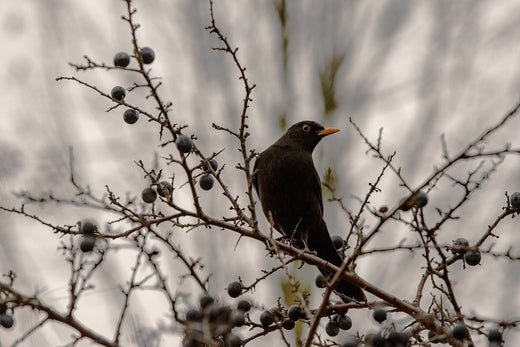
Recognising Signs of Illness in Garden Birds
Share
Garden birds bring joy to our lives, but they are vulnerable to a range of illnesses that can spread quickly among populations.
As a bird enthusiast, being able to recognise the signs of illness early is crucial to safeguarding their health and well-being. This guide highlights common clinical signs of bird illness, the actions you can take, and how to create a healthier environment for your feathered visitors.

Common Signs of Illness in Garden Birds
- Lethargy: Birds that appear unusually sluggish, resting for extended periods, or showing reluctance to fly could be unwell.
- Fluffed-Up Feathers: Sick birds often puff up their feathers to conserve body heat. While this can occur during cold weather, prolonged fluffing is a red flag.
- Wet or Dirty Plumage: Feathers that appear matted or wet around the face and beak may indicate a disease like trichomonosis.
- Difficulty Swallowing: Birds with trichomonosis or other infections may struggle to swallow food or show signs of regurgitation.
- Swollen Eyes or Discharge: Symptoms such as swollen, closed, or watery eyes can signal infections like avian pox or conjunctivitis.
- Sudden Weight Loss: A thin or weakened appearance may indicate starvation due to illness or competition for food.
What to Do If You Spot Signs of Illness
- Pause Feeding: Stop providing food temporarily to reduce congregation and limit the spread of disease.
- Clean and Disinfect Feeders: Use a wildlife-safe disinfectant, such as Safe4, to thoroughly clean all feeders and feeding areas.
- Dispose of Contaminated Food: Remove uneaten or damp food and dispose of it safely to prevent further contamination.
- Contact Wildlife Organisations: Report unusual deaths or significant outbreaks to local wildlife authorities or organisations like the RSPB.
- Isolate the Area: Keep the affected area clean and avoid reintroducing feeders until you are confident the issue has been addressed.
Preventing Illness in Garden Birds
- Hygiene is Key: Regularly clean feeders, bird baths, and surrounding areas to minimise the build-up of droppings and bacteria.
- Rotate Feeding Sites: Avoid crowding by moving feeders to different locations in your garden.
- Provide Clean, High-Quality Food: Low-quality or spoiled food can contribute to digestive and respiratory problems. Haith’s SuperClean™ diets ensure your garden birds receive safe and nutritious meals.
- Encourage Natural Foraging: Plant native shrubs and flowers to provide a natural food source, reducing reliance on feeders.
- Monitor for Changes: Keep an eye on regular visitors to your garden. Noticing changes in their behaviour or appearance early can help you intervene before illnesses spread.
Diseases to Watch Out For
- Trichomonosis: Affects the digestive system, causing difficulty swallowing and regurgitation. Common in finches and pigeons.
- Salmonella: Spread through droppings, leading to lethargy, diarrhoea, and eventual death if untreated.
- Avian Pox: Visible as wart-like growths on the face, legs, or body, it can interfere with feeding and mobility.
- Conjunctivitis: Causes swollen, watery eyes and can result in blindness if left untreated.
Salmonella and salmonellosis
Although most organisms (bacteria, viruses, fungi, parasites) that can cause disease in birds do not pose a health threat to humans, a few can do so under certain circumstances. Chief amongst these are bacteria in the genus Salmonella, some of which cause salmonellosis in humans (especially very young and very old people and those who are immunocompromised) as well as periodically being carried and transmitted by pets and wildlife.
Salmonellae, especially S enteritica, are a frequent common cause of gastroenteritis in humans but this is usually a short and self-limited illness.
The route of infection with salmonellae in both humans and animals is oral - that is, by mouth (ingestion). The bacteria cannot penetrate intact skin, nor usually can they be inhaled.
Salmonella bacteria are capable of surviving on surfaces for days, especially under cool damp conditions. The answer to preventing their spread is the regular cleaning and disinfection of the surfaces of bird-feeing areas and practising strict personal hygiene, especially hand-washing - as advocated by Haith's in its various guidelines.
Supporting Healthy Bird Populations
Recognising and responding to signs of illness in garden birds is a vital part of supporting their welfare. By maintaining clean feeding stations, providing high-quality food, and monitoring their behaviour, you can make a meaningful difference to their health. If you notice recurring issues, consider consulting wildlife experts for further guidance.

At Haith’s, we’re committed to promoting bird health and welfare. Our range of SuperClean™ bird foods and hygiene products are designed to help you create a safe, welcoming environment for your garden visitors. Visit Haith’s for more resources on responsible bird care and feeding practices.
Written by Haith's,
